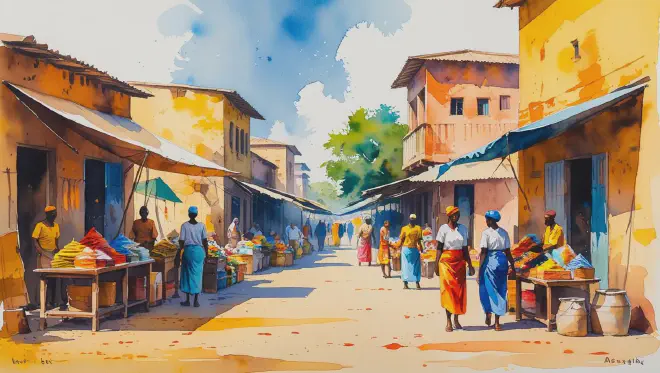Introduction: The Land of Rivers, Earth, and Memory - Senegambia
Senegambia is the historical name for the region spanning Senegal and Gambia. This stretch of West Africa was once a crossroads of trade and culture. Along the Atlantic coastline where ocean winds blow through, the Gambia River cuts through the land like a lifeline, and for generations, people’s lives have flowed alongside its currents.
The Senegalese savanna meets Gambian tropical forests, fishing villages blend with urban centers, and Islam interweaves with traditional beliefs. French and English voices mingle with Wolof, Malinke, and Mandinka languages in a symphony of sounds. Dinner tables are set with yassa (lemon-flavored chicken), domoda (peanut sauce stew), and attaya (mint tea).
This is not a destination of grand tourist attractions. Perhaps that’s precisely why it gently unravels a traveler’s heart. When you leave the bustling cities behind and settle by the riverbank, something like a deep memory quietly surfaces in your chest. That kind of journey exists here.

Day 1: Winds from Banjul
After multiple connections from my home country, I arrived in Gambia’s capital, Banjul, in the early morning. Stepping out of the airport, the humid air mixed with scents of earth and sea wrapped around my body like a familiar embrace.
Ebrahima, the young man who came to meet me, shook my hand with a warm smile, and we headed toward my accommodation. Along the way, he laughed and said, “This is a small country, but the heart is big.” His English was soft and gentle, occasionally peppered with Mandinka phrases that felt somehow comforting.
My lodge sat quietly by the river. After settling in, I sank into the bed for a while, gazing absently out the window. The Gambia River flowed lazily before me, and a kingfisher darted across the water’s surface.
In the afternoon, Ebrahima guided me to Serrekunda Market. The voices of people, the aroma of vegetables, and vibrant fabrics layered upon each other made the space feel alive and breathing.
At a street stall, I ordered domoda with rice. A woman offered the plate with a radiant smile, asking in Mandinka if this was my first time. When I nodded, she said, “It’s hot, but it’s a taste that stays in your heart.”
She was absolutely right. The fragrance of peanuts, the gently spicy sauce - by the time I finished eating, both sweat and travel tension had melted away.
Back at the lodge, men in the courtyard were brewing attaya - mint tea. When I approached, they immediately welcomed me into their circle.
The ritual of attaya served in three rounds: bitter, sweet, then bitter again. Joining their conversation while feeling the Gambian night breeze, I looked up to see stars so dense they seemed within reach.
Day 2: River Memories and Village Warmth
While darkness still lingered, I left the lodge and traveled upstream on the Gambia River by small boat. Mangroves lined the riverbanks, water birds took flight, and within the silence, a sense of life pulsed everywhere.
We stopped at a riverside village. Children waved their hands calling “Tabolo!” - welcome. Mud-brick houses, the scent of firewood, bleating goats - somehow, it all felt familiar.
A village woman let me touch shea butter in her palm. Sweet with an earthy fragrance. As I rubbed it into my hands, I felt like I was becoming part of this land.
In the afternoon, we visited Janjangbureh village, where I could experience traditional music. My body naturally began moving from my feet up, following the rhythm of the drums.
The djembe’s rhythm wasn’t just sound - it felt like ancestral memory. Adama, the young man teaching me, said, “The drums are language.” His words lingered in my chest.
At evening, we shared a meal under a baobab tree. Rice dishes similar to couscous and plenty of vegetable stew. While eating, someone began playing a flute, and the wind carried the melody away.
Returning to the lodge, Ebrahima and I gazed at the river together. “How do the stars look in your country?” he asked.
“Not as close as here,” I replied. He laughed and said, “That’s one of this country’s treasures.”
Under the stars, another sip of attaya. Few words, but a clear heart.
Day 3: Journey’s End and Reflection
In the morning, the call to prayer echoed from a nearby mosque. It blended with the river’s flow, seeping into the stillness like a gentle prayer settling into my soul.
Before departure, I shook hands with the lodge staff. Rather than regret, I felt a strange satisfaction. Though the journey was brief, something had settled deep within my heart.
Ebrahima drove me to the airport. Along the way, he said, “Next time, come with your family. I want your family to see this river too.”
From the airplane, the Gambia River gleamed silver below. Its flow seemed like a single line continuing into the depths of my chest.
It was a short journey. Yet something had certainly been carved within me.
Conclusion: What Felt Real in Imagination
This journey never actually existed. I have never been to Gambia or Senegal. Yet the landscapes that emerged from maps, photographs, and words truly passed through me.
The bitterness of attaya, the warmth of domoda, the resonance of djembe drums, the river’s flow - though all imaginary, each became a memory I could genuinely feel.
What is travel? Standing on foreign soil isn’t the only form of journey. Time spent moving one’s heart through imagination is also a kind of travel.
Senegambia, this land, offered me quiet proof of that truth.

